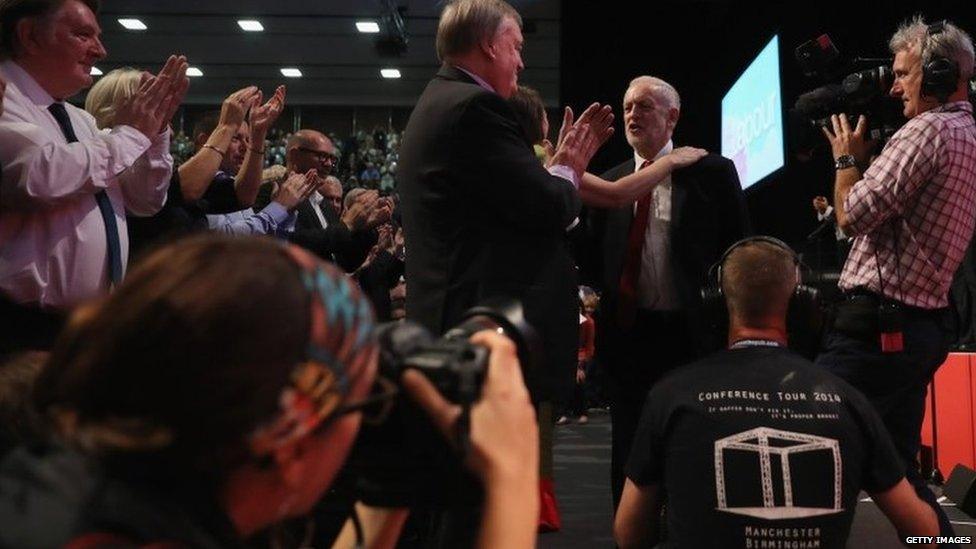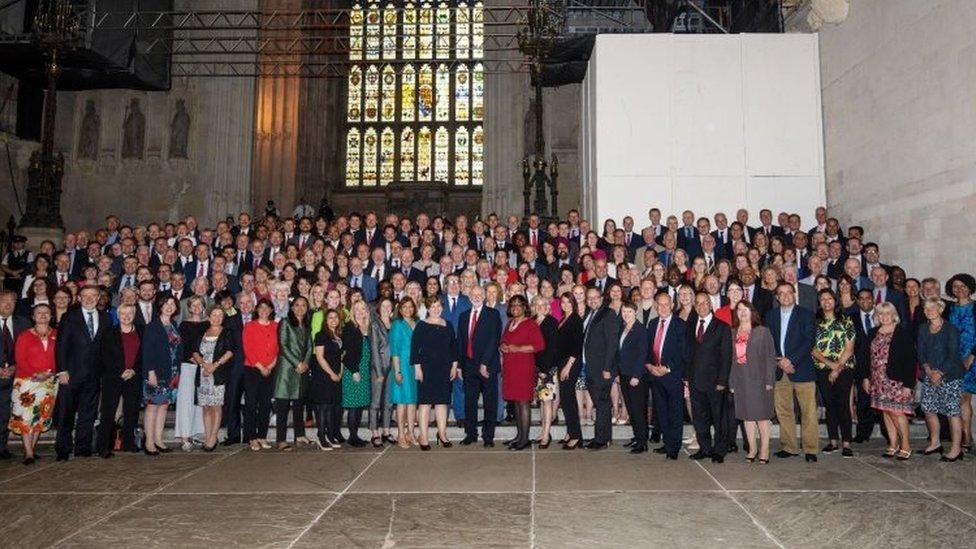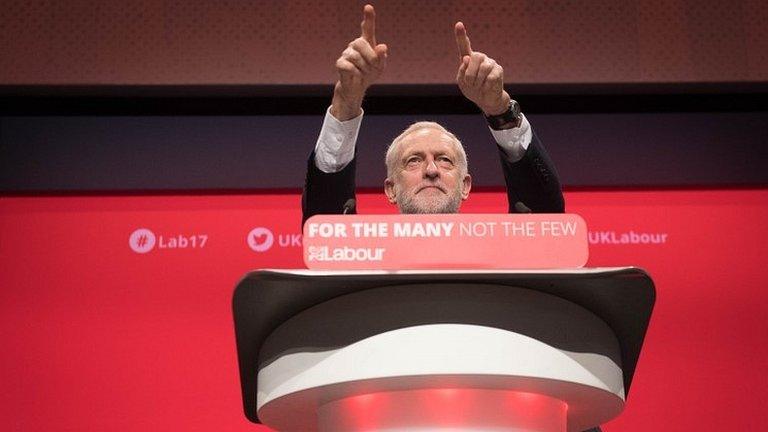What now for Labour MPs who criticised Jeremy Corbyn?
- Published

His grip on Labour has never been stronger.
The adoring, ecstatic reception received by Jeremy Corbyn at his party conference, the serenades of the delegates and the delight at his policy ideas, combined with the big organisational gains made by his supporters in Labour's internal machinery show a leader in complete command.
Which poses a bit of a problem for the Labour MPs - a majority of their parliamentary party, remember - who were trying to ditch him, just a year ago. Somewhat to their surprise, most of them are still there; one effect of a snap election was that they didn't face retribution through a re-selection process.
And the Corbyn surge kept them in Parliament when many expected to lose.
I know of one MP who went to bed on election night, having written a concession speech which called for Mr Corbyn to quit, having led Labour to catastrophe. At midnight they had to perform a rapid re-write.
What do they do now? They tread very carefully.
There are several powerful reasons for this. Mr Corbyn remarked that Labour "remain in opposition… for now." No Labour MP wants to rock the boat when the Conservative government might well unravel, and perhaps trigger another election.
Then there is the change in Labour's internal balance of power. Before this conference Mr Corbyn's opponents still had a measure of control - which could be seen before the election, when selections for new candidates in safe Labour seats mostly went their way. But no longer.
The left swept the board in elections to the National Constitutional Committee, which, depending on your point of view, has been the establishment inquisition, or the key buttress of party discipline.
And the ruling National Executive Committee now has a left majority, including of the key party officers. This means that the conference calls of key NEC members that take urgent decisions like choosing a panel of potential candidates for a by-election is no longer outwith the leader's control.
All this amounts to a diminution of the power of the Deputy Leader, Tom Watson, whose powerbase was within the organisation. Watching the play of expressions across his face, as he sits next to his leader has long been one of the most interesting pastimes at PMQs.
His speech was relegated to a graveyard slot on Tuesday evening and he has to make his peace with an entrenched leader. Labour's rising stars are those who already have - Emily Thornberry, Jon Ashworth and Angela Rayner.
In full: Laura Kuenssberg interviews Jeremy Corbyn
Meanwhile the old pre-Corbyn establishment finds itself outnumbered and out-organised - their opponents at the conference were organising through Whatsapp which channelled guidance on key votes and even advice on the arguments to make.
Meanwhile, the leader's mocking dismissal of the Blairite dogma that "elections are won from the centre ground," was a painful reminder that Labour is moving well beyond many of its MPs' ideological comfort zone.
Any MP contemplating breaking ranks would look at those facts and understand that they could not expect institutional protection, were their constituency activists to seek to deselect them.
I recently heard a tale of a Labour MP who made a policy of going to meet new members of his local party; a considerable task since some had quintupled in size. "Why did you join?" he asked one new arrival. "To deselect you," came the answer.
But there does remain an issue which could see parliamentary splits, and it's coming up fast - Brexit.
Labour conference: Highlights of Corbyn leadership
From a party management point of view, the decision not to hold a conference debate on Brexit made perfect sense; why air a genuinely divisive issue, especially when it is the anti-Corbyn forces' main point of attack? But eventually those divisions will out.
MPs are going to spend much of the autumn debating the detail of the EU Withdrawal Bill, and an active group of backbenchers will be pushing a series of "soft Brexit" amendments, while the front bench, remembering that Labour represents both the most pro-Remain and the most pro-Leave Commons seats, tries to hold a more reserved line.
Jeremy Corbyn used his speech to argue that only his party could unite Leavers and Remainers, by offering a positive vision of Brexit. Easy to say… it could well prove harder to achieve, even in its own parliamentary party.
For Conservative MPs looking on, and contemplating their gathering next week, the Labour conference must have seemed pretty intimidating - both in its numbers and its confidence (the Tories have some post-election recriminating to do), but also because they don't have an answer to the Corbyn phenomenon.

There were 30 more Labour MPs after this year's election
The news that the shadow chancellor John McDonnell's team has been war-gaming a run on the pound, in the event of a Labour government being elected will, doubtless provide an attack line, but they need a positive vision too.
Some Tories want to return to their old time Thatcherite religion - tax cuts and free markets; others are big-state Conservatives with an interventionist agenda of their own.
Both sides of that argument wonder if there's a new, statist public mood that Labour is responding to, while they're left pondering what to do.
The effect of this conference on the Conservatives may be just as important as the effect on Labour.
Tory dissidents, too, will think twice before breaking ranks. A little licensed rebellion on process issues in the EU Withdrawal Bill may be tolerated, but woe betide any Conservative MPs who do anything that could trip the Government into an early election - be they backbench awkward squaddies or grand Cabinet ministers with leadership ambitions.
- Published27 September 2017
